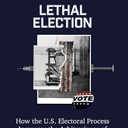
Lawyers for Marcus Dansby (pictured), a defendant facing capital murder charges in Allen County, Indiana, have filed a motion asking the trial judge to declare Indiana’s death penalty unconstitutional and to bar prosecutors from seeking death in his case. In pleadings submitted to the court on October 30, 2018 in support of Dansby’s Motion to Declare Indiana’s Capital Sentencing Statute Unconstitutional, lawyers Michelle Kraus and Robert Gevers allege that systemic defects in the administration of capital punishment from the pre-trial stage through state and federal review violate due process, the right to a jury trial, and state and federal constitutional prohibitions against cruel and unusual punishment. In a separate motion, he seeks to bar the use of the death penalty in his case based on his age at the time of the offense.
Relying on Indiana murder and execution data over a 26-year period between 1990 and 2015, Dansby’s motion argues that the state’s death penalty “is imposed arbitrarily and capriciously, with an inappropriately high risk of discrimination and mistake.” Kraus and Gevers allege that, even with prosecutors seeking death sentences in only one out of every 129 homicides from 2006 thru 2015 and executions occurring in only one out of every 535 homicides during the 26-year study period, the state’s prosecutors are not “engaging in a careful winnowing process to identify the ‘worst of the worst’ offenders and offenses for capital charging” and “the worst murderers and worst murders do not result in death sentences.” Instead, the motion argues, “geography, quality of defense representation and race” disproportionately determine who is sentenced to death. Kraus told The (Fort Wayne) Journal Gazette that the filings were a necessary part of her client’s defense, adding, “Across the nation, I think we’re seeing more and more the death penalty is falling out of favor.” Two state supreme courts have recently declared death penalty statutes unconstitutional: Delaware in 2016 and Washington in October 2018, and a Kentucky trial court found the death penalty unconstitutional for offenders younger than age 21 in 2017.
The motion also argues that the Indiana death penalty is “disproportionate and vindictive” and “has no deterrent effect,” violating both the U.S. and Indiana Constitutions. Citing research on capital jurors in Indiana and other states, the attorneys state that the capital jury selection process “creates juror bias for the death penalty,” and that “[m]any capital jurors decide the penalty in capital cases before the penalty phase, in violation of a capital defendant’s right to an individualized sentencing determination.” Indiana’s death-penalty scheme “violates due process of the law … and the Eighth Amendment prohibition against cruel and unusual punishment,” the motion asserts “because the Indiana Supreme Court has failed to develop a rational and uniform analysis for the appellate review of death sentences.” The accompanying memorandum of law provides detailed evidence for the proposition that, based on Justice Stephen Breyer’s dissent in Glossip v. Gross (2015) and the U.S. Supreme Court’s decision in Hurst v. Florida (2016), “Indiana’s four (4) decade experiment with the death penalty is a constitutional failure.”
Dansby’s lawyers also challenge Indiana’s system of judicial sentencing, which they say violates U.S. Supreme Court decisions giving capital defendants the right to have a jury decide all facts that can lead to a death sentence. In a separate motion, they seek to extend Supreme Court case law that currently prohibits the use of capital punishment against defendants younger than age 18 when the offense occurred. They cite recent brain science studies that show that key portions of the brain are still not fully developed in adolescents aged 21 and younger and argue that prosecutors should be barred against seeking the death penalty against Dansby because he was just 20 years old at the time of the crime.
(Matthew LeBlanc, Reject death penalty, judge asked, The Journal Gazette, November 1, 2018.) Read the Motion to Declare Indiana’s Capital Sentencing Statute Unconstitutional and the accompanying Memorandum in Support. See Arbitrariness.



